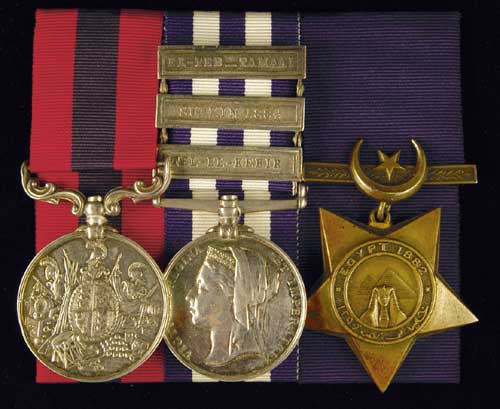
Auction: 7012 - Orders, Decorations, Medals & Militaria
Lot: 606
An Exceptional ´El-Teb´ D.C.M. Group of Three to Troop Sergeant-Major T. Taylor, 19th Hussars, Wounded in the Battle, 29.2.1884 a) Distinguished Conduct Medal, V.R. (874 Tp: Sergt. Maj: T. Taylor. 19th Hussrs. 29th. Feb: 1884), edge bruise b) Egypt 1882-89, dated, three clasps, Tel-El-Kebir, Suakin 1884, El-Teb_Tamaai (874. Tp: Sgt. Maj: T. Taylor. 19th Hussars.) c) Khedive´s Star 1882, good very fine or better, mounted for display (3) Estimate £ 5,500-6,000 D.C.M. London Gazette 6.5.1884 The Submission to the Queen, dated 23.5.1884, requests ´That a Silver Medal for Distinguished Conduct in the Field be granted, together with a Gratuity of £5, to each of the undermentioned non-commissioned officers and men, for their gallant services during the recent operations in the Soudan: - Sergeant Major Burke Military Police; Sergeant Phipps 19th Hussars; Troop Sergeant Major Taylor 19th Hussars...´ 872 Troop Sergeant-Major Thomas Taylor, D.C.M., born Wedgemill, Hertford; enlisted 19th Hussars, 1867; Corporal 1870; Sergeant 1873; Troop Sergeant-Major 1877; served in the Soudan and was wounded, ´sword cut to head received in action at Battle of El Teb on 29th February 1884´, for which battle he also received his D.C.M. (service papers refer). The War in Egypt and Soudan by T. Archer offers more insight into the part played by the cavalry at the battle of El Teb, where a British force of approximately 4,500 engaged some 10,000 Arabs, ´During the early part of the battle the cavalry had been kept well in the rear of the infantry, but when the square was seen to be forcing its way into the enemy´s lines, and the Arabs were seen to be withdrawing from their position, General Stewart, who was in command of the cavalry division, swung round far to the right of the infantry, and led his men against a large body of Arabs visible in the plain beyond the ridge. They had halted after pursuing the flying foe for some little distance, when the news reached them that Colonel Webster, who with a hundred men had formed the third line, had been attacked by a great number of the enemy on the right; the order "left about" was sounded immediately. The enemy soon showed in great force, some mounted, some on foot. As the cavalry neared them the footmen threw themselves among the tufted hillocks and little mounds of which the whole plain was made up. As the cavalry swept over them, the horses leaping the little hillocks and swerving at the sight of the dark figures lying among them, the Arabs sprang to their feet in the intervals of the horsemen, and discharged their spears, or as they lay thrust them into the horses, and then as the animals fell sprang upon the riders, and cut them down before they could gain their feet. At the same time some thirty Arab horsemen rode boldly at the squadron. There was a short, sharp hand-to-hand fight, and but three of the enemy made their way through the line, and these, turning the instant they had passed through, pursued the charging squadron before whose swords the rest of their comrades had just fallen. Colonel Barrow was pierced by a spear which passed through his arm and entered his body, but having lost their commander the squadron still charged on although the opposition they encountered was becoming momentarily hotter and hotter. General Stewart, who was riding somewhat in advance of the advance of the left flank of the second line, seeing a large body of Arabs rushing down on the right flank of the first squadron, galloped forward with his staff to arrest the further advance, followed closely by the 10th Hussars, but before they could reach the first line they had to cut their way through the foes. Of the general´s four orderlies, one was killed and two were wounded. Here Major Slade of the 10th Hussars fell; his horse was hamstrung by an Arab footman, and before the major could gain his feet he was pierced with seven spear wounds. Lieutenant Probyn of the 9th Bengal Cavalry, attached to the 10th Hussars, was killed, as was Lieutenant Freeman of the 19th Hussars; and twenty men were killed and as many wounded of the 10th and 19th´. The British losses had been small, with the exception of the Cavalry; the total being 30 killed and 142 wounded, in comparison with the Arab losses of 2,000. Taylor, one of the number wounded, was invalided out of the army 25.11.1884, after 17 years and 144 days service with the Colours.
Sold for
£6,000




